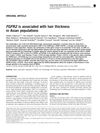 April 2024 in “Prostate international”
April 2024 in “Prostate international” Male pattern baldness does not cause an increased risk of prostate cancer.
 September 2023 in “Medicina-lithuania”
September 2023 in “Medicina-lithuania” The study suggests that analyzing DNA can help treat hair loss, but more research is needed.
July 2023 in “International Journal of Molecular Sciences” Trapa bispinosa Roxb. extract may help reduce prostate size and cell growth in BPH.
 May 2023 in “Journal of Clinical Medicine”
May 2023 in “Journal of Clinical Medicine” New understanding and treatments for hair loss are improving, but more research is needed.
 October 2022 in “BMC genomics”
October 2022 in “BMC genomics” RNA editing significantly affects hair growth and follicle cycling in the Tianzhu white yak.

Certain gene variations and different levels of BDNF and CRH hormones are linked to vitiligo.
 July 2019 in “Journal of Investigative Dermatology”
July 2019 in “Journal of Investigative Dermatology” The research found that male pattern hair loss is mostly genetic and involves hair thinning due to hormonal effects and changes in gene expression.
April 2023 in “Medizinische Genetik” Male-pattern hair loss is largely influenced by genetics, with key genes identified.
 December 2023 in “Frontiers in pharmacology”
December 2023 in “Frontiers in pharmacology” Progesterone initially worsens but later reduces neuropathic pain in mice, through different mechanisms.
 11 citations,
January 2015 in “Journal of The European Academy of Dermatology and Venereology”
11 citations,
January 2015 in “Journal of The European Academy of Dermatology and Venereology” Hair loss gene linked to prostate issues.
March 2021 in “Medico-Legal Update” The androgen receptor gene doesn't affect women with recurrent spontaneous abortions, but having a mutant genotype might protect against it.
 89 citations,
August 2008 in “Human genetics”
89 citations,
August 2008 in “Human genetics” The EDAR gene greatly affects hair thickness in Asian populations.
 45 citations,
July 2009 in “Journal of human genetics”
45 citations,
July 2009 in “Journal of human genetics” A gene variation is linked to hair thickness in Asians.
32 citations,
September 2013 in “Breast cancer research” A specific gene variant is linked to a higher risk of hair loss from chemotherapy in breast cancer patients.
 23 citations,
January 2014 in “International Journal of Biological Sciences”
23 citations,
January 2014 in “International Journal of Biological Sciences” African American men with prostate cancer have more androgen receptor mutations, which may lead to more aggressive cancer compared to Caucasian American men.
 14 citations,
April 2019 in “Genes”
14 citations,
April 2019 in “Genes” Researchers found a genetic region that influences the number of coat layers in dogs.
9 citations,
May 2019 in “Medicine” The C-allele and CC-genotype in the PTPN22 gene lower the risk of alopecia areata.
 3 citations,
January 2012 in “Hanyang Medical Reviews”
3 citations,
January 2012 in “Hanyang Medical Reviews” The document concludes that more research is needed to create suitable diagnostic criteria and understand PCOS in Korean women, and genetics may allow for personalized treatment.
September 2017 in “The journal of investigative dermatology/Journal of investigative dermatology” Male-pattern baldness has a weak link to heart disease and some related health conditions.
 January 2014 in “Elsevier eBooks”
January 2014 in “Elsevier eBooks” The study concluded that genetic mutations affect human hair diseases and identified key genes and pathways involved in hair growth and cycling.
A specific gene change in APCDD1 increases the risk of hair loss.
 June 2023 in “medRxiv (Cold Spring Harbor Laboratory)”
June 2023 in “medRxiv (Cold Spring Harbor Laboratory)” Nociplastic type pain, common in Chronic Overlapping Pain Conditions, is a complex, heritable trait linked to 24 unique genetic factors and 127 genes, with potential shared mechanisms in cognitive, personality, and metabolic traits.
 75 citations,
October 2010 in “Mammalian genome”
75 citations,
October 2010 in “Mammalian genome” Sphynx cats are hairless and Devon Rex cats have curly hair due to specific genetic mutations.
12 citations,
July 2015 in “Tissue Antigens” The A allele of the C2 gene increases the risk of lupus, while the G allele may protect against it.
 October 2024 in “Journal of the Endocrine Society”
October 2024 in “Journal of the Endocrine Society” Certain genetic variants reduce enzyme activity, contributing to non-classic congenital adrenal hyperplasia.
 March 2023 in “Journal of Cosmetic Dermatology”
March 2023 in “Journal of Cosmetic Dermatology” A genetic variant linked to hair thinning in Japanese women was found.
 March 2018 in “Suez Canal University Medical Journal”
March 2018 in “Suez Canal University Medical Journal” NKG2D gene polymorphism doesn't affect SLE risk but may influence symptoms like rash and hair loss.
 30 citations,
June 2016 in “Journal of Human Genetics”
30 citations,
June 2016 in “Journal of Human Genetics” Researchers found genetic mutations causing hypohidrotic ectodermal dysplasia in 88% of studied patients and identified new mutations and genetic variations affecting the disease.
 6 citations,
November 2019 in “The application of clinical genetics”
6 citations,
November 2019 in “The application of clinical genetics” The study found that a specific genetic variation in the TNFα gene is significantly linked to Alopecia Areata in the Jordanian Arab population.





















